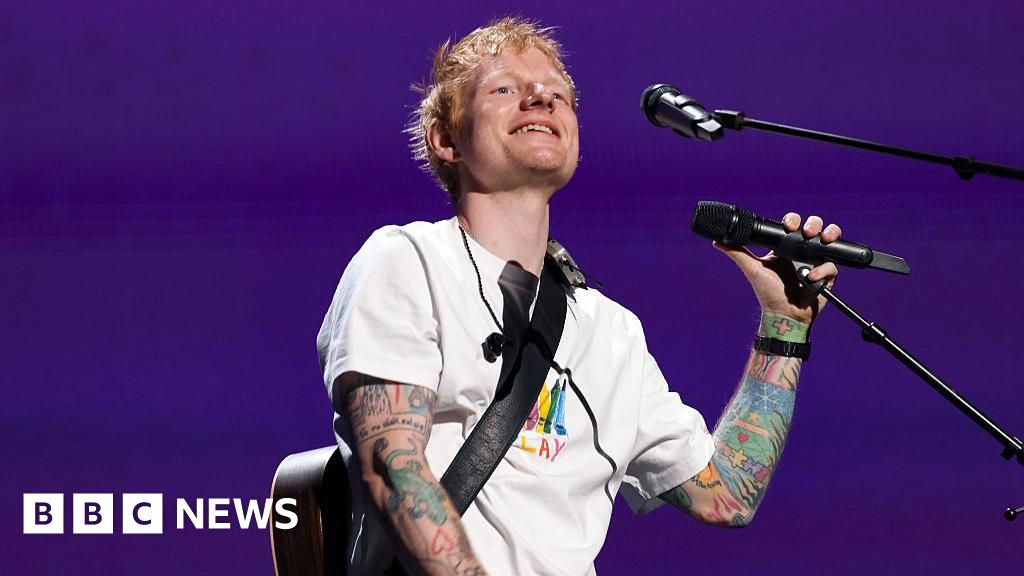Sheeran praises curriculum changes which mean more kids will study music

Ed Sheeran Hails Curriculum Changes Prioritising Music Education in England
Singer-songwriter Ed Sheeran has lauded recent changes to the national curriculum in England, which will see greater emphasis placed on creative subjects like music. The reforms aim to modernise education, removing what the government describes as "outdated systems" that previously hindered students' access to arts education.
Curriculum Overhaul Focuses on Breadth and Relevance
The curriculum review, the first in over a decade, will also incorporate lessons on identifying misinformation, disinformation, and understanding financial instruments like mortgages. Education Secretary Bridget Phillipson stated the government's intention to "revitalise" the curriculum while maintaining a "firm foundation" in core subjects such as English, maths, and reading.
Head teachers have responded positively to the recommendations, deeming them "sensible" but stressing the need for "sufficient funding and teachers" to ensure successful implementation. The changes follow a government-commissioned review designed to create a "cutting edge" curriculum and address attainment gaps between disadvantaged students and their peers.
EBacc Scrapped to Encourage Broader Subject Choices
A key alteration is the removal of the English Baccalaureate (EBacc), a performance measure for schools introduced in 2010. The EBacc assessed schools based on the number of pupils taking English, maths, sciences, geography or history, and a language. The Department for Education (DfE) deemed the EBacc "constraining," believing its removal, alongside reforms to the Progress 8 ranking system, will encourage students to pursue a wider range of GCSE subjects, including arts.
Sheeran, a vocal advocate for music education, has stated that without the support he received in school, he would not be a musician today. In March, he penned an open letter to the government, supported by artists such as Harry Styles, Annie Lennox, and Sir Elton John, calling for increased investment in music education and the abolition of the EBacc.
“These curriculum reforms give young people hope and the opportunity to study music," Sheeran said. "Without the encouragement I received in school, especially from my music teacher, I wouldn't be a musician today. My music education went beyond learning and playing. It helped me find confidence in myself, and music itself was - and still is - so important for my mental health."
Government and Arts Council Welcome the Changes
Prime Minister Sir Keir Starmer acknowledged Sheeran's advocacy, promising to revitalise the arts in schools under his leadership. "I wanted you to know that your voice has been heard," the Prime Minister wrote. "Learning music at school made a huge difference to my life. We will make sure every child has access to those experiences...so that creativity isn't a privilege, but a right."
Arts Council England echoed this sentiment, calling the curriculum reforms "a great day for the next generation of creative talent in England."
Other notable reforms include:
Financial literacy taught in maths classes or compulsory citizenship lessons in primary schools. Increased focus on spotting misinformation and disinformation, potentially including a new post-16 qualification in data science and AI. Reducing GCSE exam time by up to three hours per student on average. Ensuring all children can take three science GCSEs. More content on climate change. Better representation of diversity.
The review also recommended giving oracy (speaking skills) equal status to reading and writing, a move welcomed by the charity Voice 21 as a "vital step forward" for developing children's communication skills.
Concerns and Criticisms Voiced by Opposition
However, not all responses have been positive. Shadow Education Secretary Laura Trott criticised some of the changes, stating that while she agreed with certain "elements," others were "fundamentally wrong" and "really bad for standards." She accused the government of "education vandalism" and claimed the reforms would disproportionately affect disadvantaged children.
Former Conservative schools minister Nick Gibb expressed concern that scrapping the EBacc would lead to a decline in foreign language study, concentrating it among privately educated students. The Liberal Democrats welcomed the broadening of the curriculum but criticised the decision to scrap the EBacc, citing concerns about funding and workforce strategy.
Expert Analysis: Evolution, Not Revolution
Professor Becky Francis, who chaired the curriculum review, emphasized that the approach was "evolution not revolution," noting that English pupils already perform well against international averages. She addressed concerns about diversity representation, clarifying that it was not about "getting rid of core foundational texts and things that are really central to our culture," but about recognising diverse contributions to science and cultural progress.
According to Dr. Eleanor Hayes, a leading education researcher at the Institute for Policy Studies in Education, "The emphasis on creative subjects is a welcome step towards a more holistic education. However, the success of these reforms hinges on adequate funding and support for teachers. Without these, the changes risk becoming superficial, failing to truly benefit students, particularly those from disadvantaged backgrounds." Hayes also highlights the importance of ongoing evaluation, noting that a rigorous assessment of the curriculum's impact will be crucial to ensure it achieves its intended goals of fostering creativity and addressing attainment gaps.
Pepe Di'Iasio, general secretary of the Association of School and College Leaders, acknowledged the "sensible, evidence-based set of reforms" but cautioned that delivering a "great curriculum" requires "sufficient funding and teachers," which schools currently lack.
Originally sourced from: BBC Entertainment
